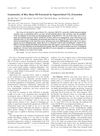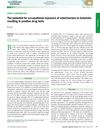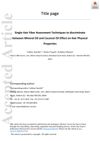 2 citations,
March 2015 in “Toxicology and Environmental Health Sciences”
2 citations,
March 2015 in “Toxicology and Environmental Health Sciences” Rice bran extract caused moderate skin irritation but no eye irritation, while a diluted essence was not irritating to skin and only slightly to guinea pigs.
 32 citations,
December 2013 in “Biological & Pharmaceutical Bulletin”
32 citations,
December 2013 in “Biological & Pharmaceutical Bulletin” Rice bran extract can potentially treat hair loss by promoting hair growth and increasing the number of hair follicles.
 7 citations,
January 2015 in “Biological & Pharmaceutical Bulletin”
7 citations,
January 2015 in “Biological & Pharmaceutical Bulletin” Rice Bran Supercritical CO2 Extract significantly increased hair density and diameter in male alopecia patients without any side effects.
 7 citations,
January 2014 in “Biological & pharmaceutical bulletin”
7 citations,
January 2014 in “Biological & pharmaceutical bulletin” Rice bran oil extracted by supercritical CO2 is considered non-genotoxic.
 47 citations,
August 2016 in “Fitoterapia”
47 citations,
August 2016 in “Fitoterapia” Some herbs and their components might help treat hair loss by affecting various biological pathways, but more research and regulation are needed.
 25 citations,
July 2017 in “Archives of Dermatological Research”
25 citations,
July 2017 in “Archives of Dermatological Research” Herbal products might promote hair growth with fewer side effects, but more research is needed to confirm their safety and effectiveness.
 8 citations,
April 2020 in “Journal of Ethnopharmacology”
8 citations,
April 2020 in “Journal of Ethnopharmacology” Herbs might help with hair loss, but more research is needed to confirm their safety and effectiveness.
 1 citations,
May 2017 in “InTech eBooks”
1 citations,
May 2017 in “InTech eBooks” Some natural remedies may help with hair regrowth, but more research is needed to confirm their effectiveness and safety.
 August 2023 in “Vittalle”
August 2023 in “Vittalle” Mais estudos são necessários para garantir a eficácia e qualidade dos tratamentos de alopecia com plantas medicinais.
 April 2023 in “Acta Poloniae Pharmaceutica”
April 2023 in “Acta Poloniae Pharmaceutica” Herbal extract shampoo increased certain minerals in hair and improved hair growth and scalp health.
 82 citations,
September 2018 in “Nature Communications”
82 citations,
September 2018 in “Nature Communications” A certain smell receptor in hair follicles can affect hair growth when activated by a synthetic sandalwood scent.
 1 citations,
December 2022 in “BMC Plant Biology”
1 citations,
December 2022 in “BMC Plant Biology” The black orchid Brasiliorchis schunkeana produces chemicals that attract certain insects and have potential antimicrobial properties.
 3 citations,
February 2018 in “Australian Veterinary Journal”
3 citations,
February 2018 in “Australian Veterinary Journal” Veterinarians could test positive for ketamine from work exposure, not just substance abuse.
 62 citations,
July 1993 in “Journal of Investigative Dermatology”
62 citations,
July 1993 in “Journal of Investigative Dermatology” Hair growth is influenced by interactions between skin layers, growth factors, and hormones, but the exact mechanisms are not fully understood.
 27 citations,
August 2018 in “Therapeutic Delivery”
27 citations,
August 2018 in “Therapeutic Delivery” Nanotechnology could make hair loss treatments more effective and reduce side effects, but more research is needed before it's available.
 21 citations,
July 2017 in “Journal of Cosmetic and Laser Therapy”
21 citations,
July 2017 in “Journal of Cosmetic and Laser Therapy” Vesicular carriers like liposomes may improve cosmetic skin treatment delivery and effectiveness but need more human research.
 17 citations,
April 2021 in “Clinical Phytoscience”
17 citations,
April 2021 in “Clinical Phytoscience” Chitrak is a medicinal plant with health benefits like fighting microbes, reducing inflammation, and promoting hair growth, but it can be toxic and needs more research.
 12 citations,
February 2014 in “Recent Patents on Inflammation & Allergy Drug Discovery”
12 citations,
February 2014 in “Recent Patents on Inflammation & Allergy Drug Discovery” Shampoos have evolved into multifunctional products with patented innovations for different hair needs and can include medicinal herbs for hair and scalp health.
 3 citations,
February 2008 in “Basic and clinical dermatology”
3 citations,
February 2008 in “Basic and clinical dermatology” Telogen Effluvium is a hair loss condition where treatment involves identifying and managing its triggers.
 October 2017 in “Springer eBooks”
October 2017 in “Springer eBooks” A thorough initial check-up is essential before sperm banking to ensure the best chance of preserving good quality sperm.
 43 citations,
January 2013 in “Indian Journal of Dermatology, Venereology and Leprology”
43 citations,
January 2013 in “Indian Journal of Dermatology, Venereology and Leprology” The article concludes that advancements in hair cosmetics require dermatologists to stay informed about products and their potential risks, including allergies and higher risks for hairdressers.
 27 citations,
December 2015 in “Mayo Clinic Proceedings”
27 citations,
December 2015 in “Mayo Clinic Proceedings” The document concludes that lifestyle changes and medical treatments can significantly reduce symptoms of Hidradenitis Suppurativa, a chronic skin condition.
 17 citations,
February 2015 in “Phytochemistry Reviews”
17 citations,
February 2015 in “Phytochemistry Reviews” Southeast Asian herbs show promise for skin and hair care, but more research is needed to confirm their effectiveness in cosmetics.
 9 citations,
October 2018 in “Elsevier eBooks”
9 citations,
October 2018 in “Elsevier eBooks” Nanotechnology is improving drug delivery and targeting, with promising applications in cancer treatment, gene therapy, and cosmetics, but challenges remain in ensuring precise delivery and safety.
 6 citations,
January 2021 in “Journal of Cosmetic Dermatology”
6 citations,
January 2021 in “Journal of Cosmetic Dermatology” Poor sleep during the pandemic may increase stress and worsen hair loss conditions.
 3 citations,
September 2020 in “Journal of cosmetic dermatology”
3 citations,
September 2020 in “Journal of cosmetic dermatology” Coconut oil makes hair stronger and more flexible than mineral oil.
 1 citations,
November 2023 in “International Journal For Multidisciplinary Research”
1 citations,
November 2023 in “International Journal For Multidisciplinary Research” Herbal shampoos are safer and perform well, but need more research to improve quality.
 1 citations,
June 2018 in “Advances in Cosmetic Surgery”
1 citations,
June 2018 in “Advances in Cosmetic Surgery” PRP might help with hair growth and skin rejuvenation, but more research is needed to prove its effectiveness.

Good nutrition may help prevent premature hair graying.
 January 2019 in “Springer eBooks”
January 2019 in “Springer eBooks” Some chemicals and drugs can cause hair loss, which usually grows back after stopping the treatment.





























